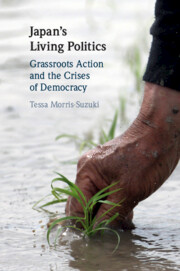Book contents
- Japan’s Living Politics
- Japan’s Living Politics
- Copyright page
- Contents
- Maps
- Figures
- Acknowledgements
- Maps
- 1 Japan and the Crisis of Democracy
- 2 Living Politics
- 3 The White Birch and the Earth
- 4 Rethinking the Village
- 5 Peasant Art, Free Drawing and the Free University
- 6 The Body Politic
- 7 Seeds of Democracy
- 8 Development from Within
- 9 Disaster and Aftermath
- 10 Conclusions and Beginnings
- Bibliography
- Index
8 - Development from Within
Environment, Region and Autonomous Action from the 1980s Onward
Published online by Cambridge University Press: 16 April 2020
- Japan’s Living Politics
- Japan’s Living Politics
- Copyright page
- Contents
- Maps
- Figures
- Acknowledgements
- Maps
- 1 Japan and the Crisis of Democracy
- 2 Living Politics
- 3 The White Birch and the Earth
- 4 Rethinking the Village
- 5 Peasant Art, Free Drawing and the Free University
- 6 The Body Politic
- 7 Seeds of Democracy
- 8 Development from Within
- 9 Disaster and Aftermath
- 10 Conclusions and Beginnings
- Bibliography
- Index
Summary
The prewar activities of the White Birch teachers, and the related postwar activities of rural youth groups and social educators, provided the basis which sustained a new wave of informal life politics from the 1980s onward. As rural areas began to suffer acutely from problems of depopulation and aging, and as schemes to disperse industrial activities to the regions led to environmental conflicts, local communities looked to alternative forms of endogenous development to secure their own futures. This chapter explores examples of the search for ‘development from within’, focusing particularly on the cases of the Shinshū Miyamoto School (Shinshū Miyamoto Juku) in Nagano Prefecture and other environmental, cooperative and alternative currency projects which are linked to the school through a regional network of self-help action.
Keywords
- Type
- Chapter
- Information
- Japan's Living PoliticsGrassroots Action and the Crises of Democracy, pp. 158 - 178Publisher: Cambridge University PressPrint publication year: 2020

